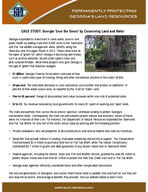CASE STUDY: Georgia `Sees the Green' by Conserving Land and Water
Georgia expanded its investment in clean water, tourism and public health by adding more than 9,500 acres to the Townsend and Flat Tub wildlife management areas (WMA's along the Altamaha and Ocmulgee Rivers in 2013. These lands have all the types of `green' for which Georgia is becoming well-known, such as pristine wetlands, record-sized cypress trees and pine-covered hillsides. What these projects also give Georgia is the type of `green' that balances budgets.
$3 billion: Georgia Forestry Association's estimate of how much is spent every year on hunting, hiking and other recreational activities in the state's WMAs.
20 percent: The estimated decrease in costs realized by communitites that protect an additional 10 percent of their water source area, as reported by the Trust for Public Land.
Five to 20 percent: Range of documented land value increases within one mile of protected lands.
$2 to $3: Tax revenue received by local governments for every $1 spent on working and `open' lands.
The state and partners from across the economic spectrum contribute funding to protect Georgia's conservation lands. Consequently, the state can permanently protect natural and economic values of these areas for a fraction of their cost. For instance, the Department of Natural Resources expanded the Townsend and Flat Tub WMAs for only half of the land's actual value by working with the following partners.
Private landowners who sell properties at discounted prices and receive federal and state tax incentives.
Nonprofits that provide millions in funding, invaluable leadership and technical support. The Conservation Fund borrowed $2.4 million to purchase land next to Flat Tub WMA, while The Nature Conservancy contributed $2.7 million in grants and debt guaranties to buy Boyles Island next to Townsend WMA.
Federal agencies, including the Marine Corps and Fish and Wildlife Service, granted the state $5 million to protect Boyles Island and more than $1 million to protect the Red Oak Creek tract next to Flat Tub WMA.
Georgia state agencies efficiently coordinate these and other complicated transactions.
Not only will generations of Georgians and visitors inherit these lands to paddle, hike and hunt on, but they will also reap the economic and ecological benefits they provide. Visit our website below to learn more.
